- Home
- Barry Unsworth
The Ruby In Her Navel Page 9
The Ruby In Her Navel Read online
Page 9
They fell silent and the man I had first addressed turned to me. "It is the mules," he said. "We have three mules. They are good mules, very valuable."
I was offering them a royal reception, with the chance of royal favour, I was promising them more gold than they could ever have had at any one time in all their lives. And they were holding out against it for the sake of three miserable mules that were not worth more than two ducats each, and a good deal less if in bad condition!
"So we are asking," he said. "Can we keep our mules?"
"Take them with you? You mean on the ship?"
I paused on this, daunted by the prospect of explaining, in terms that he would understand, the cargo of caged birds that we would be taking next day, and how much more difficult, and even chaotic, it would be if in addition to the five of them and my two guards and the crew, we had mules trampling about on the deck. "We will return to the inn," I said, "and sell the mules to the innkeeper. He can keep them there until he finds a buyer."
This proposal led to further lively talk among them, but finally it was agreed, and we set off back, the women riding, the two men walking and we three making up the rear. The night was far advanced when we reached the inn, and both the innkeeper and his wife were abed, but I wanted the business done, so woke the serving lad, who was sleeping in the yard, and told him to rouse them. The man came down, though in an ill-temper that he took little care to conceal. When I asked him to make an offer for the mules he answered in surly fashion that he had no need of mules.
Then, no doubt realising his advantage – he could see I was in haste to conclude the sale – he made an offer of derisory smallness, eight folles for the three, and in spite of all my efforts he would not budge from this.
"I am here on the King's service," I said. "This contemptible behaviour of yours will be included in my report and the consequences to you will be serious." By this I sought to put him in fear, but it was an empty threat, and in his lowness and insignificance he knew it for such.
Palermo was far, he knew he was a beetle not worth the crushing.
Besides, what offence had he committed? He could hardly be punished for shrewdness in commerce; it was a virtue of our good King Roger himself, one widely admired as enriching the realm and therefore all who lived within it.
So I was in a quandary. It was long past midnight, the town was sleeping. If I wanted to keep the trust of these people and show my good intentions, they would have to be given a fair price for their mules.
The only way I could see of achieving this was to buy the mules myself.
But there was the purchase of the birds next day; I knew the price I was to pay per bird, but could have no knowledge of how many birds there would be. Furthermore, there was the expense of my journey to Bari and the return. And there might be other claims on my purse that I could not foresee. On the other hand, I had to get these people on board ship as soon as possible, so as to make it the less likely they would change their minds about going.
"I will buy your mules," I said. "I will give you four silver ducats for them."
This offer set up a clamour among them, the nature of which I only understood when the drummer turned to me and said, in the quieter tone he used for commerce outside the group, "We want nine ducats for the mules." And he showed me the backs of his hands with the thumb of the left one folded inward to make his meaning plain.
Nine ducats! It was far more than they were worth. The innkeeper and these travelling people between them gave me a memorable example of human rapacity that night. It was true that I had offered less than a fair price, but this was because I was worried about my expenses. If I paid what they asked they would take me for a fool and all our future dealings would be coloured by it.
I paused for a moment or two, wondering what line it would be best to take. The yard felt crowded with mules and people, the people full of noise and exclamation, the mules for the moment docile, tethered companionably together in the moonlight, their ears laid back as if they were quietly aware of being under discussion. There were six altogether, with the three we had hired. Sometimes, unexpectedly, a man is struck with wonder at where he finds himself and what he finds himself doing.
Glancing now at these animals, I had such a feeling: I had come to this place on a quest for herons, only to find myself beset with mules.
I took six ducats from the purse at my belt, where I kept the stock needed from day to day, and displayed them on my open palm. The moon was high now, its light reached every corner of the yard, and the silver coins gleamed as I held them out. "Six ducats," I said. "Not a kharruba more."
They did not know the Arabic word but they understood my meaning well enough and this time the talk among them was of the briefest. As I had shrewdly thought might be the case, the sight of the coin was more than they could withstand. They were poor and ragged, they lived without knowing what the next day would bring. The price they had set on the mules had been in the nature of a dream; the night had brought them dreams of wealth already – why not one more?
There and then the sale was agreed and the ducats handed over. I was pleased for a while with my own sagacity, and the decisive gesture with which I had won them over. But then it came to me that I had after all paid somewhat more for the beasts than they were really worth, moreover there was nothing in the world I could do with them but leave them with this miscreated innkeeper.
"I make you responsible for these animals, purchased in the King's name," I said sternly to him. "You will be held to account."
He gave me a ruinous grin but said nothing. I knew beyond question that he would sell the beasts then give them out as having died or strayed. I was heartily sick by now both of him and them, and it was a relief to get clear of his foul-smelling yard.
By the time we had reached the harbour and roused the captain and told him to treat his passengers kindly and got them on board with their instruments and their bundles, the moon was over the sky and there was a feeling of dawn soon coming. I was tired but my mind was active, I had no inclination for sleep, nor desire for any company but my own at this quiet time before daybreak. I told Mario and Sigismond that they could share the room I had paid for or sleep in the yard, as they liked. If that pig of an innkeeper was asleep they could shout till they woke him.
I would keep to myself a little, wait for the day.
VII
As I look back on it now, this choosing to walk abroad, alone and in unfamiliar surroundings, when I was carrying money belonging to the crown, was a sign in me of disaffection, of desire for change. It is true that not many were stirring at such an hour, true also that I had not full trust in my guards when we were in deserted places together.
But the chanceries of the palace, no matter in which you served, schooled you to guard against mishap, however remote the chance of it, and this then became a rooted habit – one which I broke that night on no more than a whim. I knew that if anything went amiss with the purchase of the birds, I would be called to account. It might be that Yusuf would protect me and I would keep my place, but it would count against me in future – in his mind too. I had been a success in the Diwan of Control, baulking at nothing that was given me to do, even things that might be thought base or unworthy if it were not that they were done in the King's service. But one thing botched could outweigh all this and tip the scales against my succeeding to Yusuf's place when he became Grand Chamberlain. And I wanted this, as I have said, wanted the wealth and state of it, the release from bad roads and bad inns and purse-carrying.
Nothing untoward occurred, I saw no one. With daylight I returned to the inn, where I was served by the innkeeper's wife with bread and cheese and thin ale. Then I slept for perhaps an hour, in my chair as I sat there. Waking, I found Mario and sent him back with our mules.
Afterwards, my two men once more at my shoulders, I mounted the steep streets until I was above the town, looking inland to where the marsh people would come from. They would come sometime in the morn
ing, having set off the evening before on news of my arrival, and travelled through the night. They would not arrive much before noon, I thought; they would be on foot, encumbered with the caged birds. I found a place where there was a ruined house, part of the stone terrace still remaining, and sat down here with my back against a broken wall. There was a view of the plain below, and the road they would come by.
I was content to wait quietly here. It was a cloudless morning, there were gulls wheeling above on the seaward side, from somewhere close by there came the sound of goat bells. The dancing of the night before came back to me as I sat there, the firelight and the moonlight, the strains of that wild music, sad and fierce at the same time, the languorous sway of the bodies, the quick-stepping feet, the strange moment of shuddering before the body was stilled again and that rippling of the belly began.
I remembered the gleaming arms of the one I had watched – I had watched only her, it now seemed to me. That posture of the body savage in its pride, that suffering look about the mouth, dissolving in joy when she smiled. Straight shoulders and a deep curve from the waist to the hips.
Then at the inn, loud-voiced and bold-eyed, people used to contempt, careless of it. Outcast people. Ararat, where the ark came to rest for mankind to be saved, and where giants lived in old times. Was she beautiful of face or not? I could remember only the mouth and the smile…
I was still thinking of this girl in a rather sleepy fashion when the sun rose clear of the hills and I saw a flash of white in the distance, where the road descended, like a swift signal one might make with some bright surface of metal held up to the sun. It came again, then again, then there were many, and the first of the men came into view at the point where the road finished its descent and curved round into the open plain.
They had come earlier than I expected. They walked in single file, the caged birds hanging from yokes that went across their shoulders, two on either side, as far as I could make out, and swaying with the motion of their walking, so that the newly risen sun elicited flashes of light as rapid as blinking from their breasts and wings. I counted twelve men, and as they came into the sun they were robed in splendour by the birds.
The splendour was less, however, both in the men and in the birds, on closer view, at the harbour where I went down to wait for them. The cages were made of thin cane and they were tall, to accommodate the long, slender legs, with their black shanks and yellow toes. But they were narrow, the herons could not turn, they were forced to stay in the one position, hunched and dejected. The men were like spectres, pale and hollow-eyed, and I took this to be the result of the marsh-sickness that people speak of, that comes from dwelling constantly in the flooded lands, among the mists that rise there.
At the harbourside the scene was one of great confusion. There were mules tethered there also, for what purpose I knew not – my visit to this town was plagued by mules from beginning to end. Disturbed by the swinging cages and the people milling round, these beasts began to bray and shift about, and one or two of them kicked back in that spirit of indiscipline and revolt that descends on mules at certain accursed moments. The tortured sounds they made and the clatter of their hooves on the stone disturbed the birds and they tried to flap their wings but could not, and first one then another set up a desolate wailing sound, wulla-wulla-wulla, like the loud grief cries that Arab women make when they raise their heads and let the sounds come from far back in the throat. To add to this, the birdcatchers were thronging round me with their feverish faces, clamouring for my attention, telling me how particularly fine these birds were, what pains it had cost to trap them.
They had singing voices, despite the fervour of their pleas, every phrase reaching a high note then sonorously descending, with the last word amazingly drawn out, as if indeed they had decided to end in song.
As I strove to understand them – no easy matter, they sang all at the same time – I caught sight of the Anatolians standing at the stern of the ship, looking down at the spectacle and laughing among themselves.
Fortunately the theme before us was one of extreme simplicity, they asking more for the herons, I offering less. They knew quite well that the price for bird and cage was established beforehand, but there was still a hope in them, which I supposed perennial, quenched one year only to be renewed the next, that they could get more if only the right arguments could be found. They spoke of adverse weather, changed patterns of flight, fewer numbers. One man, more inventive than the others, tried to make me believe that the herons had grown in cunning.
These last had quietened now but looked far from cunning, their yellow eyes staring and fearful, as if knowing their fate, knowing the cruel talons that awaited them, though I thought that when the moment came, when they were struck down by the hawk like a bolt from the sky, their eyes would have a different look, their wings would be outspread, till that moment of death they would be in possession of freedom. Unluckier, as it seemed to me, were those already sickening, those who had spent too much time in the cage. But I knew no way to detect this and refuse payment, so saving my master from wasteful expenditure: drawing near to the town, the men would have cleaned the cages, washed the putrid excrement from the elegant dark legs…
There were forty-eight birds. Payment, when we finally agreed on it and struck hands together, came to sixteen silver ducats, money that would keep these people and their families in oatmeal and salt and oil through the winter to come.
The bargaining, though no more than a pretence, had been a lengthy process, and I was much relieved when all was settled and we had the birds on board and the catchers had set off on their journey homeward.
Soon the ship would be casting off and I would be free to proceed with my mission. I was about to go aboard again to give final instruction to the master, who at that moment was nowhere to be seen – I thought perhaps he had taken refuge somewhere below from all that tumult. He had done this run before, more than once, with my predecessor, Filippo Maiella, a person who had become more real to me in the course of this transaction with the herons, so much so that I found it hard not to see things through his eyes. Eleven years of the wailing birds in their cages – the twelfth had been too much for him. There was the money in his purse, the beckoning distance…
I needed to find the master and talk to him. He had carried herons to Palermo before, but he had not carried dancers and musicians, or so I supposed. He was the best person to trust with the matter as he had touched no coin yet – the reverse of the case with Filippo. He would have to accompany them to the Diwan of Control and deliver them to the care of my clerk Stefanos, who would arrange for their lodgings. Then, and only then, he would receive his payment and give the crew their part of it.
Thinking these thoughts and seeing the master nowhere on land, I was mounting from the quayside to the deck when I heard a sudden outcry, a female voice raised to a pitch like that of the screech owls that live in the hills round Lake Poma. The sound startled the herons, who set up that desolate wailing again, wulla-wulla-wulla, and tried to flap their wings inside the cages. When I reached the top of the ladder, I saw, across the ranks of lamenting herons, the furious face of the younger dancer, who was standing in the stern a little apart from the others. I say standing but she had crouched a little, drawing her shoulders together, as if about to spring. Facing her at some two or three paces distance, foolishly leering in spite of the girl's rage, was one of my guards, the hulking Sigismond. It came to my mind immediately that he had offered her some insult, perhaps laid hands on her, even tried to pull her away; he was a brutish fellow and must have been roused by her dancing of the night before – in my sudden anger at his behaviour I forgot that I too had been roused by it.
She had moved away from the others, perhaps to see better what was going on below, but now I saw the two men come forward, saw how they widened the distance between them as they drew nearer to Sigismond, saw that one had a hand inside his shirt. I moved quickly towards them, overturning cages in my haste. St
rangely, the herons bore this in silence, they had all fallen silent now, as had the girl at my approach. Her hair was loose about her face and she had a long pin in one hand, copper, I thought – it shone with a dull light.
Drawing nearer to Sigismond I saw at once, even before I smelled the wine on his breath, that he had been drinking, saw it from the way he had planted his feet and the foolish bravado of his smiling. "What is this?" I said.
He was grinning still, as if seeking to indicate by this that it was some sort of a joke. Perhaps, in his primitive way, he had lost sight of the borders between public and private, thought that a woman who danced before men could be any man's.
I did not intend to make much of the matter. No harm was done, the fellow had been routed, he would know better than to try again. But when I gestured him with the back of my hand, indicating that he should back away and give ground, his grin faded and he did not lower his eyes but stared back at me with what seemed deliberate insolence. Nor did he give room, as ordered.
I felt my anger rise. To reach this state he must have started with the flagon on his own, before any money had been handed over, probably while the marsh people were thronging round me, in other words while he should still have been fulfilling his duties as my guard. "You misbegotten wretch," I said. "How dare you brave me in this way? Step back."

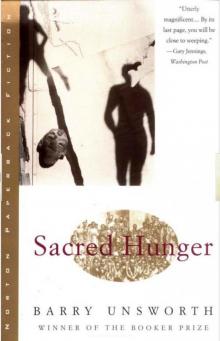 Sacred Hunger
Sacred Hunger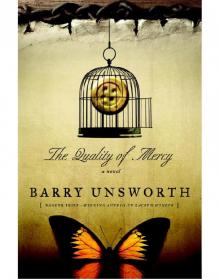 The Quality of Mercy: A Novel
The Quality of Mercy: A Novel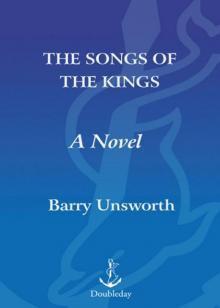 The Songs of the Kings: A Novel
The Songs of the Kings: A Novel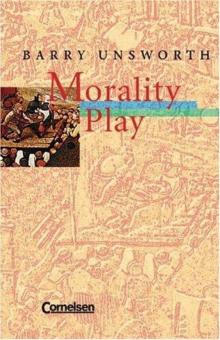 Morality Play. Mit Materialien. (Lernmaterialien)
Morality Play. Mit Materialien. (Lernmaterialien)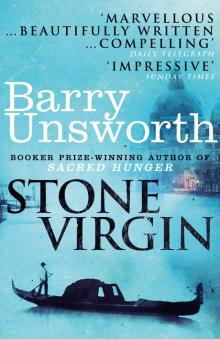 Stone Virgin
Stone Virgin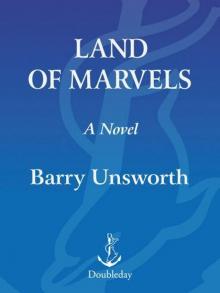 Land of Marvels
Land of Marvels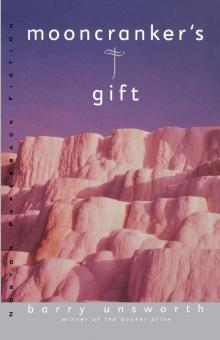 Mooncranker's Gift
Mooncranker's Gift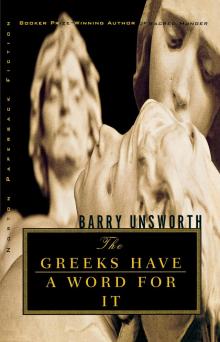 The Greeks Have a Word for It
The Greeks Have a Word for It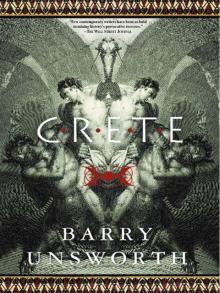 Crete
Crete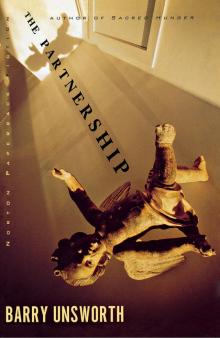 The Partnership
The Partnership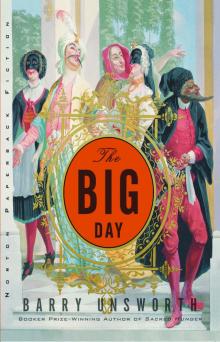 The Big Day
The Big Day The Hide
The Hide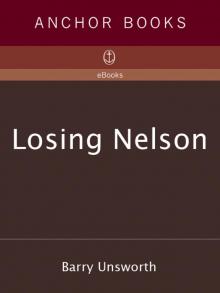 Losing Nelson
Losing Nelson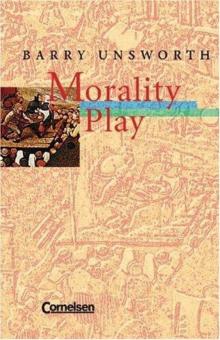 Morality Play
Morality Play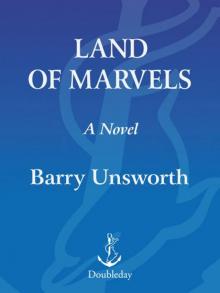 Land of Marvels: A Novel
Land of Marvels: A Novel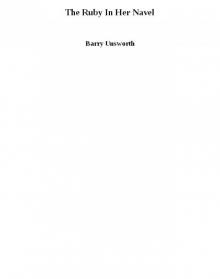 The Ruby In Her Navel
The Ruby In Her Navel